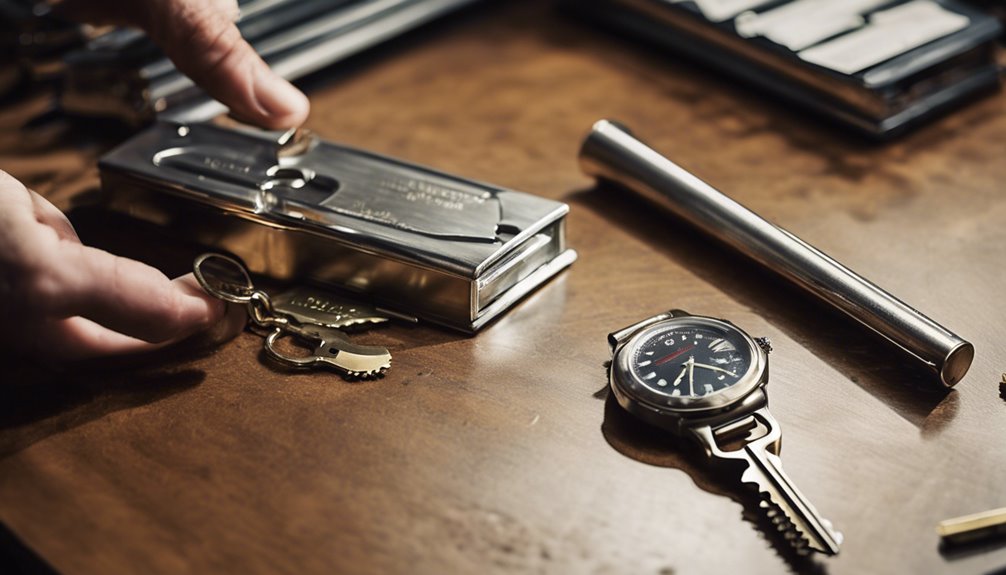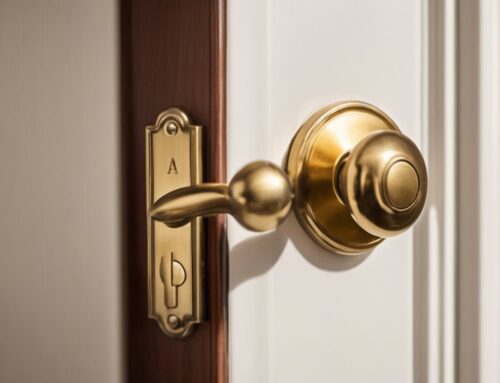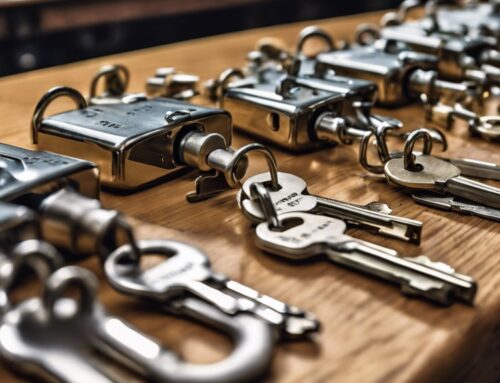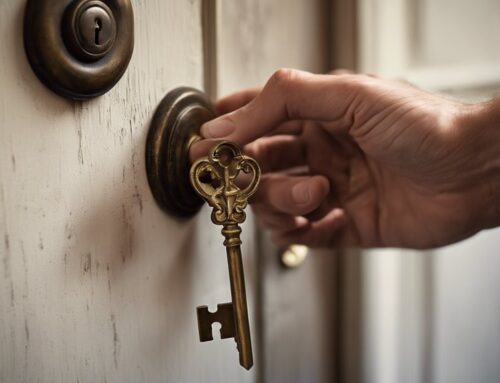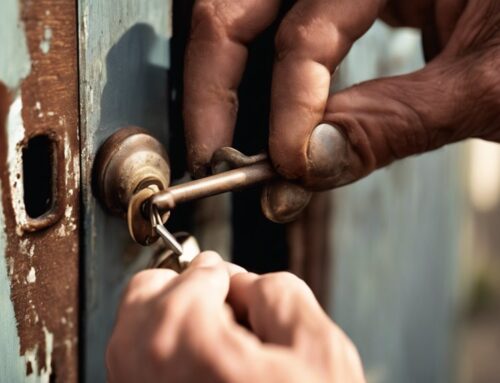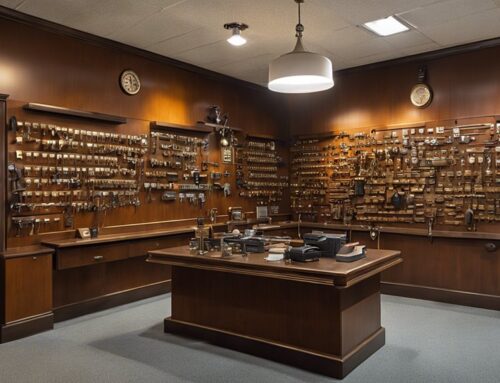A key isn't just a piece of metal; it represents security and trust. When you're in the business of key duplication in Illinois, understanding the legal landscape is essential. You need to guarantee ownership verification and navigate licensing requirements, especially with restricted keys like "Do Not Duplicate." Failing to follow these legal considerations can lead to significant consequences. So, what are the specific responsibilities you have to uphold to safeguard both your clients and your business?
Key Takeaways
- Key duplication must comply with U.S. Patent Laws and avoid unauthorized duplication of restricted keys, which can incur fines up to $10,000.
- Proper licensing is mandatory for locksmiths; applicants must have good moral character and pass a comprehensive exam through IDFPR.
- Verification of ownership and authorization is essential before duplicating keys, requiring documented proof like ID or company records.
- Strict adherence to ethical practices, including respecting "Do Not Duplicate" markings, is crucial to maintain trust and avoid legal repercussions.
- Regular training and updates on compliance standards are necessary for locksmiths to uphold operational integrity and quality control measures.
Key Duplication Legal Framework
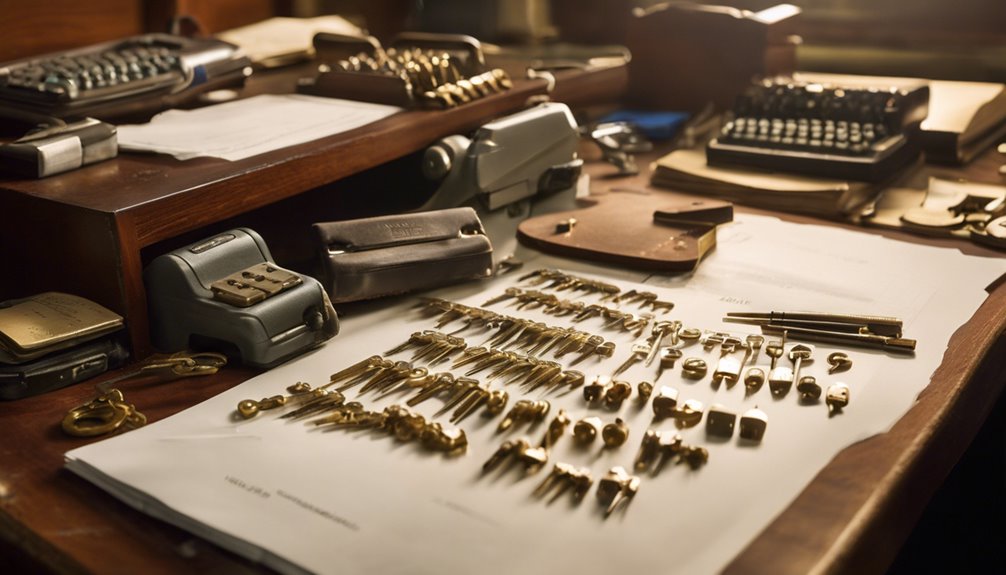
When you consider key duplication, it's vital to understand the legal framework governing this practice, as it varies considerably based on key type and applicable laws. The laws distinguish between various key types: for instance, "Do Not Duplicate" keys have no legal restrictions against duplication, although many retailers may refuse to reproduce them.
In contrast, restricted keys are protected under U.S. Patent Laws, and duplicating them without permission can lead to fines as high as $10,000. It's important to note that some locksmiths can duplicate common keys, such as Yale and safe keys, typically allow for straightforward duplication by licensed locksmiths. However, car keys present a challenge; many contemporary car keys require a specialized process for creation, complicating the duplication landscape. Additionally, understanding the relevant lock picking laws is crucial when engaging with key duplication services, as improper use of tools may lead to legal repercussions. In the realm of rental properties, landlords have the right to rekey locks as a security measure, providing a legal basis for changing locks.
It's essential to recognize that any key duplication must be performed with the property owner's consent or for legitimate purposes. Unlawfully duplicating keys, particularly with intent to commit a crime, is a serious offense that could entail criminal charges.
In Illinois, the law mandates that key duplication should align with state statutes, and using lock-picking tools with unlawful intent is illegal.
Important legal principles include ensuring compliance and awareness of local regulations, especially before engaging a locksmith. By understanding these legal nuances, you empower yourself to navigate the complexities of key duplication responsibly and lawfully, ensuring your freedoms aren't inadvertently compromised.
Licensing Obligations for Locksmiths
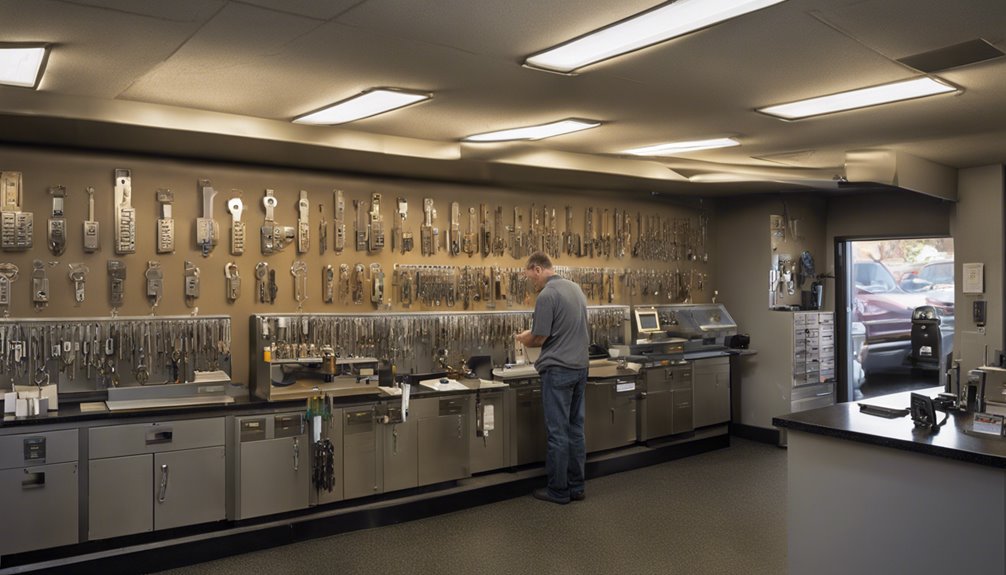
Though many people may see locksmithing as a straightforward trade, understanding the licensing obligations for locksmiths in Illinois reveals a complex framework vital to maintaining professional standards.
To legally operate as a locksmith, you're required to be at least 18 years old, demonstrate good moral character, and refrain from any felony convictions unless at least ten years have passed since your sentence's full discharge. Honorably discharged military personnel also have a clearer path, as dishonorable discharges may disqualify you. Regulatory measures are in place to ensure only qualified individuals can provide locksmith services.
The licensing process involves several steps. You'll need to apply through the Illinois Department of Financial and Professional Regulation (IDFPR) and successfully pass a thorough exam that evaluates your knowledge in locksmith theory and practice. Continuous learning is essential for career advancement and license renewal, including ongoing education that will help you stay updated in this evolving field.
This exam, featuring 305 questions, is held biannually, meaning proper planning is crucial; applications must be submitted at least 60 days beforehand. In addition to the exam, you're encouraged to complete a 20-hour basic locksmith training course, though it's not mandatory.
Once you pass, you must submit fingerprints for a criminal background check and pay any applicable fees. Keep in mind that these licensing requirements will sunset on January 1, 2029.
After that date, locksmiths in Illinois will no longer be regulated. If you decide to open a locksmith agency, it's important to have a licensed locksmith as the designated licensee-in-charge and to properly register your business with state authorities.
Understanding these obligations guarantees compliance and contributes to the overall integrity of the locksmith profession.
Importance of Authorization
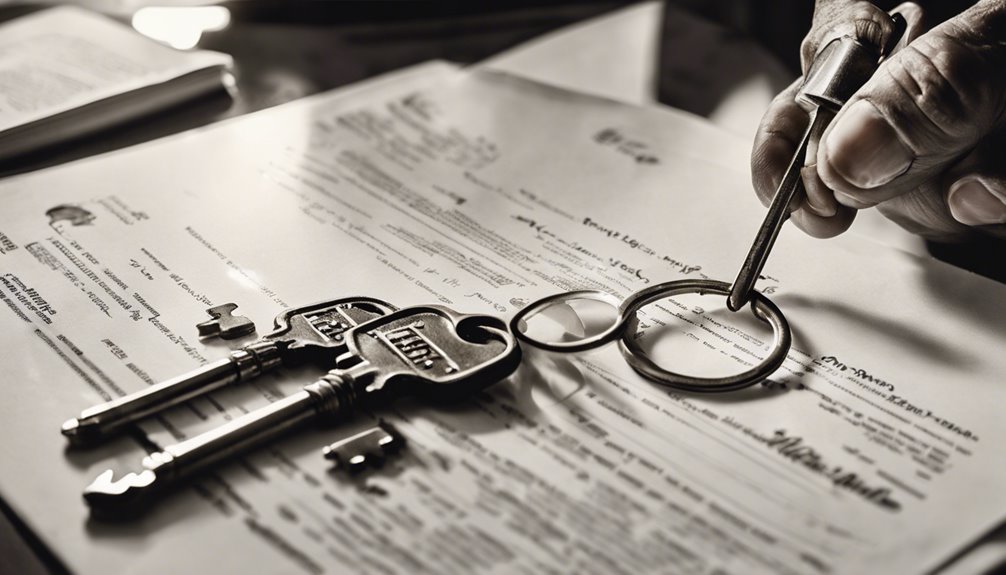
Understanding the importance of authorization can save you from potential legal headaches. Verifying legal ownership before key duplication not only protects your property but also helps locksmiths avoid severe consequences from unauthorized duplication. Compliance with the Illinois Administrative Procedure Act ensures that agencies and businesses operate within legal boundaries and maintain public trust. Furthermore, practicing without proper authorization can result in serious penalties that jeopardize both the locksmith and client. Failure to secure tenant authorization before changing locks could lead to conflicts and legal disputes surrounding rental agreements.
Legal Ownership Verification
Before duplicating a key, it's essential to verify legal ownership and obtain proper authorization, as this step safeguards against unauthorized access to properties. You can't overlook the importance of having the right documentation and authority. Failing to do so not only jeopardizes property security but can also lead to serious legal repercussions. Additionally, ensuring compliance with ADA regulations is critical for locksmith services to provide accessible options for individuals with disabilities.
| Documentation Needed | Authority to Duplicate | Legal Implications |
|---|---|---|
| Driver's license with property address | Owner's authorization required | Legal action against the locksmith |
| Mail addressed to the individual | Possible signed letter needed from the owner | Verify compliance with licensing laws |
| Car registration for automotive keys | Verify property records for owner's identity | Respect "Do Not Duplicate" imprints |
| Company records for business keys | Contact key manufacturer when necessary | Protects from unauthorized access |
| Closing statement for new properties | Confirm requester's legal access to the property | Verification fosters trust and safety |
Verification methods, like checking county records and confirming identities through official IDs, can guarantee you're sticking to legal requirements. Additionally, adhering to lock safety standards is crucial for ensuring the integrity of your key duplication services. So, always prioritize verification; it's a key step in maintaining property integrity and your peace of mind.
Unauthorized duplication of keys can have serious consequences that extend beyond just the act itself. If you're caught duplicating keys without proper authorization, you could face criminal charges under laws like Penal Code § 469. Penalties range from hefty fines to restitution payments, and in severe cases, you might even face imprisonment. A conviction can lead to a permanent criminal record, affecting both your personal and professional prospects. Additionally, locksmiths in Illinois are required to adhere to strict legal procedures that could also implicate unauthorized key duplication.
Moreover, if your unauthorized duplications enable criminal activities—like theft—you're not just risking legal repercussions; you're also endangering others. Civil lawsuits are another serious threat, as businesses or individuals whose security was compromised may seek damages, adding financial burdens to your troubles.
Security risks are also heightened with unauthorized duplications, particularly with "Do Not Duplicate" keys. These actions can dismantle security protocols, leading to theft or exposure of confidential information. Additionally, just as locksmiths follow strict legal guidelines during evictions, it's essential to understand the significance of authorizing key duplication to uphold security and legality.
To safeguard yourself and others, it's crucial to maintain a robust key management policy. Regular audits and employee training on authorized key handling can help mitigate risks and guarantee compliance, ultimately preserving your freedom from legal consequences.
Understanding Restricted Keys
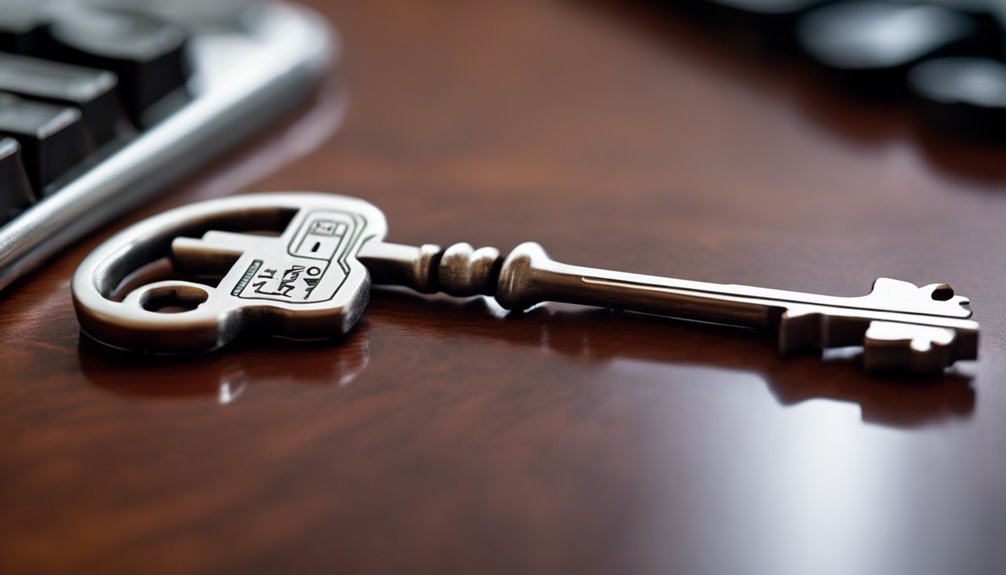
When it comes to securing property, restricted keys play an essential role in preventing unauthorized access. These keys are designed with proprietary keyway patterns that remain inaccessible to the general public, guaranteeing enhanced security. Only authorized locksmiths or the original manufacturers have the authority to duplicate these keys, which requires explicit permission—often in the form of written authorization or a registered signature. This rigorous process limits duplication requests to designated individuals, further safeguarding your property.
The unique keyway designs not only deter unauthorized copying but also protect against lock-picking attempts. Standard blank keys won't fit these proprietary locks, making traditional security breaches less effective. Enhanced features, such as anti-pick and anti-bump technologies, elevate the security level of restricted key systems beyond that of standard locks.
Moreover, every transaction concerning the issuance and duplication of restricted keys is meticulously recorded by certified locksmiths and security firms. This level of documentation guarantees accountability and makes it easy to identify who's access to specific keys and when they were issued. Maintaining detailed records dissuades unauthorized duplication attempts by providing a transparent tracking system.
In essence, restricted keys offer a robust line of defense for homes, businesses, and institutions by controlling access in a structured manner. Emphasizing security without compromising freedom, these systems empower property owners with greater control over who can enter their spaces and when.
Hence, investing in restricted key technology is a proactive step toward securing your property.
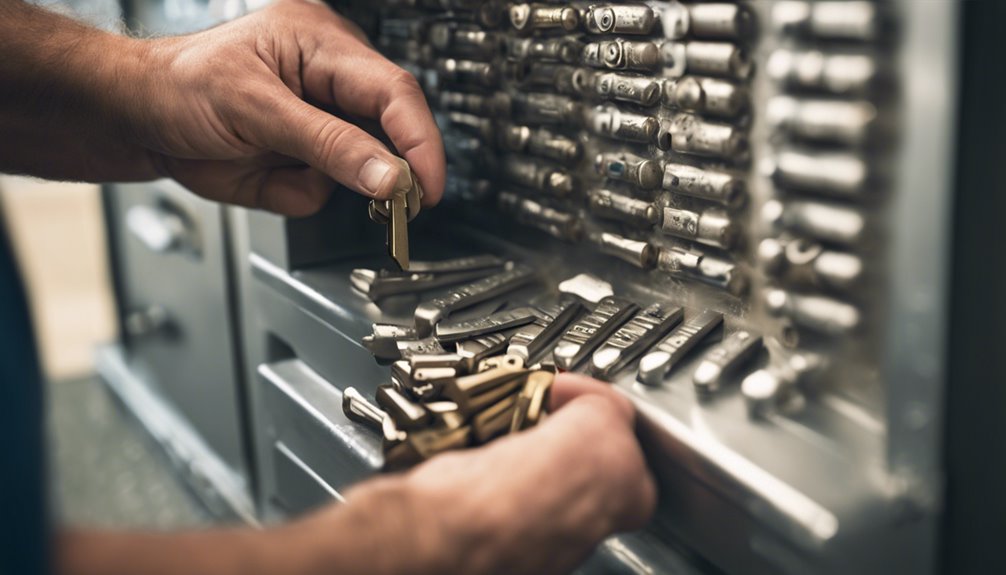
Unauthorized duplication not only poses serious security risks but also invites significant legal consequences that could impact you directly.
If you're involved in key duplication, you must understand that violations can lead to civil lawsuits, loss of reputation, and even criminal charges.
Ensuring compliance with legal standards is essential to maintaining professional integrity and avoiding costly repercussions.
Legal Consequences of Violations
Key duplication without proper authorization carries serious legal risks that can have lasting implications. Engaging in unauthorized key duplication can lead to criminal charges under laws like Penal Code § 469. Depending on your intent and the situation, these charges may range from misdemeanors to felonies, resulting in fines, possible imprisonment, and a permanent criminal record.
Financial penalties are another major concern. If unauthorized duplication leads to incidents like theft or unauthorized entry, you might incur significant costs, including legal fees and potential civil lawsuits.
Businesses, in particular, suffer from compromised security, which can lead to substantial financial losses.
Moreover, unauthorized duplication threatens the security of your property. It creates opportunities for burglary, theft, and data breaches, particularly in high-security areas like banks and government facilities.
If restricted key systems fail to follow proper controls, the vulnerability only increases.
Lastly, compliance with local laws is crucial. Violating key duplication rules, especially for keys labeled "Do Not Duplicate," can lead to serious legal ramifications.
Understanding and adhering to key duplication regulations is essential to avoid these significant challenges.
Professional Reputation Damage
While the immediate legal consequences of unauthorized key duplication often take center stage, the damage to a business's professional reputation can be equally, if not more, detrimental.
When unauthorized keys are discovered, trust among clients, partners, and employees erodes rapidly. This loss of confidence may lead clients to question your capability to secure their information, and they might seek to take their business elsewhere.
Moreover, employee morale can plummet; workers need to feel secure in their environment, and any breach can make them uneasy. The public's perception may also shift, viewing your business as negligent, which could result in long-lasting reputational harm.
This negativity not only affects current relationships but can hinder your ability to attract new clients.
Beyond reputation, the financial implications are significant. You may face direct costs to replace security systems, not to mention potential legal fees if clients initiate lawsuits due to breaches.
Unauthorized duplicates can also complicate access control, requiring additional resources for key management and emergency responses.
Ultimately, the ripple effects of a damaged reputation can far exceed initial legal ramifications, stressing the importance of always maintaining security and integrity in key duplication services.
Penalties for Legal Violations
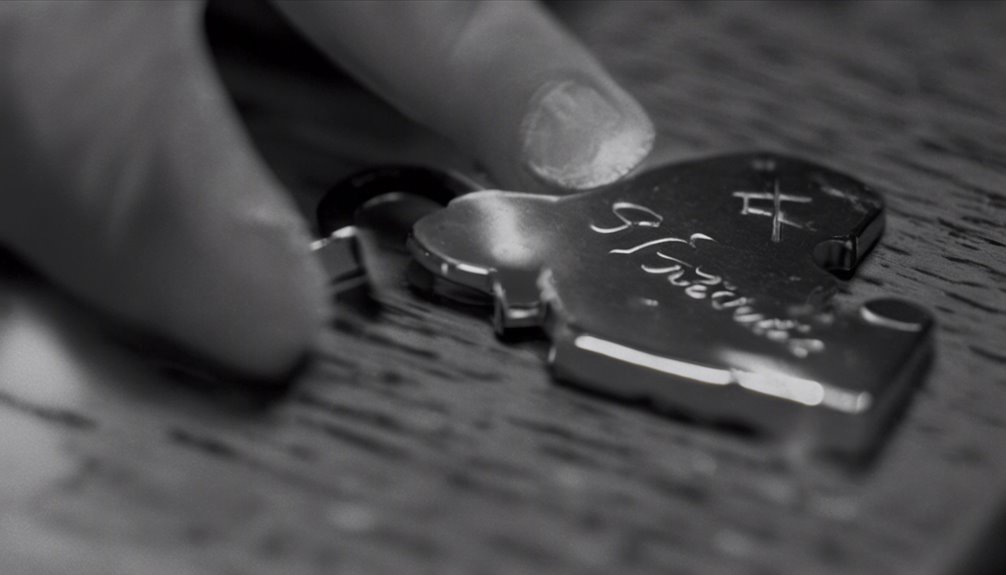
Violating legal regulations surrounding key duplication services can lead to severe repercussions that affect both individuals and businesses. Understanding these penalties is essential if you want to operate within the law and protect your interests.
Here's a concise overview of potential penalties:
- Unlicensed Practice: A first offense can result in a Class A misdemeanor, while subsequent violations escalate to a Class 4 felony, leading to immediate license revocation.
- Unauthorized Key Duplication: Engaging in key duplication without authorization can bring criminal charges, fines, and restitution. This could result in a permanent criminal record.
- Lock Picking Violations: Possession of lock picking tools for unlawful purposes can result in similar charges, including potential imprisonment and fines.
- Fraudulent Misrepresentation: Misleading authorities to obtain a license constitutes a serious offense, resulting in license revocation and possible perjury charges.
Each of these violations carries significant legal consequences that can disrupt your personal and professional life.
The penalties vary based on intention and circumstances, but they all share the ability to tarnish your reputation and hinder future opportunities.
Awareness and compliance with Illinois law are vital to maintaining your freedom and operating effectively in key duplication services.
Requirements for Key Quality

Operating within the legal frameworks of key duplication services requires a keen focus on quality standards to prevent costly errors and maintain compliance. You need to start by duplicating keys directly from the original, as copies of copies can lead to inaccuracies that compromise security.
When working with worn keys, decoding them before duplication is vital to guarantee their quality remains intact. Only use the correct key blanks that closely match the original's specifications to achieve the desired accuracy.
Utilizing precision equipment for key duplication is essential. For instance, machines like the Pro-Lok Blue Punch Machine provide the accuracy needed when cutting keys. The process demands proper alignment between the original and blank keys, assuring even cutting throughout. Regular calibration of these machines guarantees they perform at their best.
Different keys present varying challenges. Simpler designs may only take minutes to duplicate, while complex keys, including high-security locks and transponder car keys, require specialized tools and techniques. Familiarity with various key types and configurations is vital for effective duplication.
Finally, as a locksmith, you must uphold professional standards. Being knowledgeable about ethics surrounding restricted keys and confirming your training covers both key duplication and operational techniques are essential components of your practice.
In Illinois, being licensed, insured, and bonded not only enhances your credibility but also assures clients of your commitment to quality and security in key duplication services.
Responsibilities of Key Duplicators

As a key duplicator, you bear the responsibility of ensuring legal compliance with regulations and ethical standards in your work.
You must maintain accurate records to verify ownership and authorization for each key duplication, safeguarding against potential liabilities.
Understanding the importance of these practices not only protects you but also reinforces the integrity of the key duplication industry.
Legal Compliance Obligations
While understanding your legal obligations as a key duplicator may seem challenging, adhering to these requirements is crucial for both your business and your clients. Compliance with key duplication laws not only protects you from potential fines but also builds trust within your community.
Here are some critical points to keep in mind:
- Duplication of "Do Not Duplicate" keys isn't illegal, though discretion is advised.
- Restricted keys fall under U.S. Patent Laws, and unauthorized duplication can result in fines up to $10,000.
- You must comply with the duplication guidelines set by original key manufacturers.
- Tenants and landlords must communicate effectively regarding any lock changes to avoid liability.
In addition to these specifics, always verify you're licensed, insured, and bonded. This not only meets legal standards but also reassures clients about the credibility of your services.
Proper documentation is essential for verifying ownership before proceeding with duplication, particularly for commercial clients. Stay updated on both the federal and state laws to manage your responsibilities effectively.
Understanding these aspects can help foster a relationship of trust and accountability with your clients while preserving their freedom to access their properties.
Ethical Duplication Practices
Understanding the ethical responsibilities in key duplication practices helps guarantee a professional and trustworthy service. As a key duplicator, you need to prioritize the interests of key owners by verifying their identity and ensuring authorization before creating duplicates. This shows respect for property rights and individual security.
Here's a quick overview of essential ethical practices:
| Practice | Details |
|---|---|
| Legitimacy of Requests | Verify identity and ownership with documentation. |
| Handling Restricted Keys | Respect "Do Not Duplicate" markings and seek authorization for restricted keys. |
| Maintaining Quality Standards | Use industry-standard tools for high-quality duplicates. |
| Communication and Transparency | Inform clients about risks, benefits, and regulations tied to key duplication. |
Additionally, it's crucial to provide guidance on how to secure spare keys and the implications of unauthorized access. By adhering to these responsibilities, you not only maintain high ethical standards but also foster trust among your clients, empowering them to make informed decisions about their key duplication needs.
Record Keeping Importance
Record keeping serves as a foundational responsibility for key duplicators, guaranteeing compliance with legal and ethical standards. By maintaining accurate records, you not only adhere to regulations but also contribute to the integrity of your services.
Here are some key aspects you should prioritize:
- Retain records for at least three years or as specified, covering all financial statements and relevant documentation.
- Assure accessibility to any state agency or federal authority, complying with potential audits and monitoring requests.
- Protect sensitive information to maintain confidentiality and comply with regulations, such as the Freedom of Information Act (FOIA).
- Regularly review performance data to evaluate the effectiveness of your operations and identify areas for improvement.
Failure to maintain proper records can lead to serious repercussions, including penalties and loss of funding.
Consequently, keeping thorough documentation isn't just an added task; it's essential for safeguarding your organization's future.
Make certain you comply with both state and federal guidelines to uphold the trust of your clients and state authorities while enhancing your operational transparency.
Compliance With State Regulations
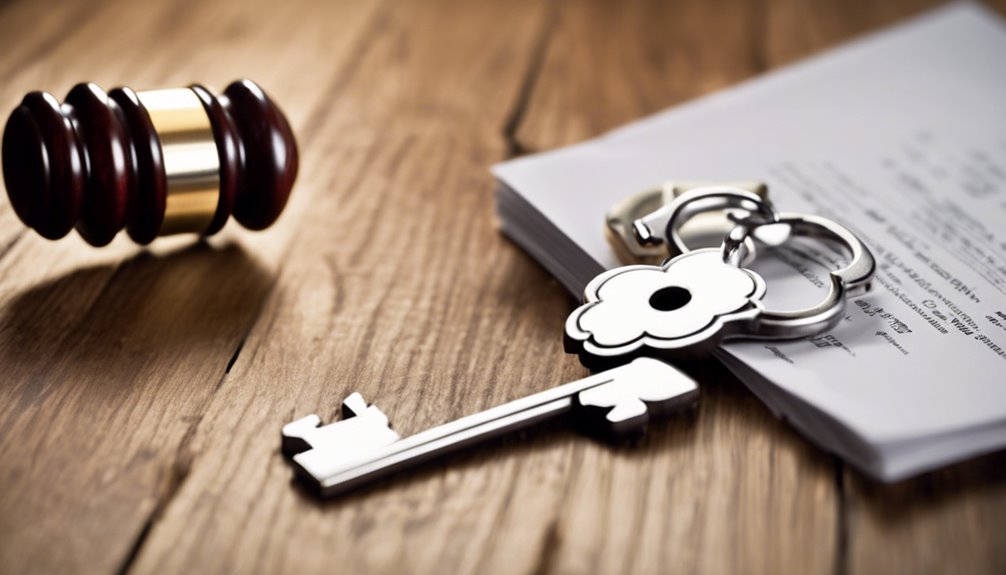
To guarantee compliance with state regulations governing key duplication services, it's essential to understand the specific licensing requirements set forth by the Illinois Department of Financial and Professional Regulation (IDFPR). You must be at least 18 years old and pass an authorized licensing exam that tests your knowledge in both theory and practical aspects.
The exam, comprised of 305 questions in multiple-choice and true/false formats, is conducted biannually in March and September. Be sure to submit your application at least 60 days prior to the exam.
Additionally, prior to being licensed, you'll need to undergo a fingerprint-based criminal background check. This is mandatory and must be completed within 60 days of your application submission. The Illinois State Police will send the background check results to the IDFPR.
Demonstrating good moral character is significant; any history of felony convictions, substance abuse, or dishonorable military discharge can disqualify you.
Paying the necessary fees, which can reach up to $300, is another step in this process. While formal training isn't required, consider completing a 20-hour basic locksmith training course to prepare for the exam.
Keep in mind that locksmith licensing laws are scheduled to sunset in January 2029, which could impact future regulatory compliance. Establishing a solid understanding of current requirements won't only keep your services compliant but will also maintain the integrity and trust of your locksmith business.
Best Practices for Key Services
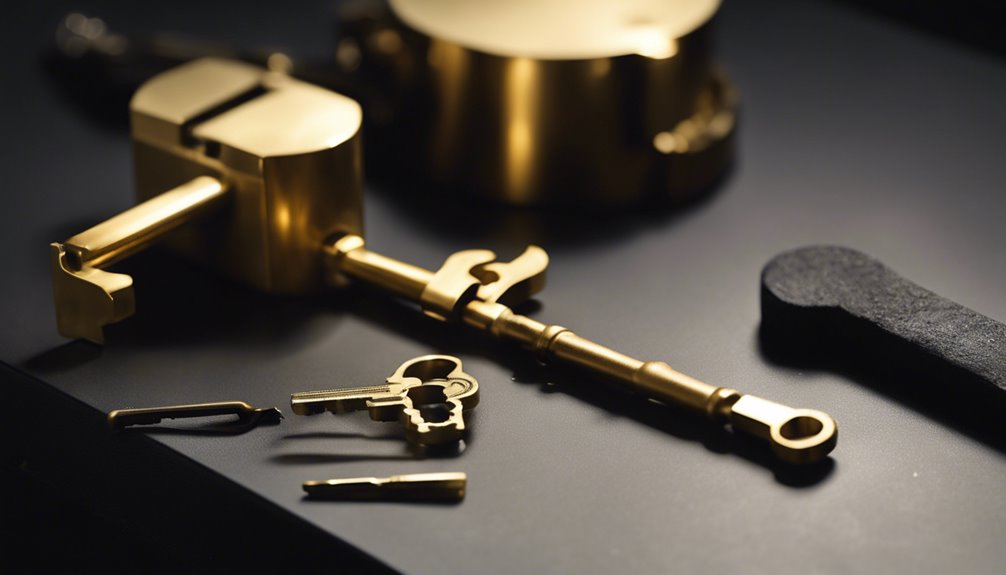
With compliance in mind, implementing best practices for key duplication services not only enhances operational efficiency but also fosters trust and security.
You need to evaluate the necessity of each key duplication carefully. This means analyzing the risks associated with unauthorized access and guaranteeing that duplicate keys are essential for your daily operations.
To optimize your key duplication process, consider following these best practices:
- Analyze the need for duplication to avoid unnecessary keys.
- Handle restricted keys with care, recognizing their legal implications.
- Maintain high-quality standards for both original and duplicate keys.
- Guarantee compliance with management policies regarding key access.
When handling restricted keys, always respect labels like "Do Not Duplicate" and contact manufacturers for authorization when needed.
Every time you create a duplicate, the quality can diminish slightly; consequently, use high-quality machines and avoid duplicating from other duplicates to maintain integrity.
It's also critical to implement strict identification requirements for key duplication, including thorough background checks for locksmiths.
Keeping a record of who accesses duplicated keys can further enhance security measures.
Adhering to these practices not only solidifies your operational framework but demonstrates a commitment to security, allowing your team to execute their duties with confidence.
Prioritizing quality and compliance isn't just a legal obligation; it cultivates an environment of trust and safety for everyone involved.
Frequently Asked Questions
Can I Duplicate My Own Keys Legally?
Yes, you can duplicate your own keys legally, as long as the keys aren't restricted or marked "Do Not Duplicate."
If your keys are standard house or padlock types, a locksmith can easily handle the duplication.
However, always verify you comply with any office or employer rules that might apply.
Checking with a reputable locksmith can help you navigate what's permissible and maintain the security of your locks.
What if I Lost My Original Key?
If you've lost your original key, don't worry—most keys can still be duplicated.
Locksmiths can often create a new key by decoding the lock or using a spare. However, for modern car keys or specialized types, it might take a bit more time and effort.
Always guarantee that you choose a reputable locksmith to maintain quality and security.
How Can I Find a Licensed Locksmith?
To find a licensed locksmith, start by visiting the Illinois Department of Financial and Professional Regulation (IDFPR) website.
There, you can verify the locksmith's license status and make certain they've passed all necessary exams. Check for any disciplinary actions, and make sure they've liability insurance.
You should also confirm that they've completed a proper training course and have a clean background.
This diligence guarantees you hire a qualified professional you can trust.
Are There Any Exceptions to "Do Not Duplicate" Keys?
Around 25% of locksmiths report duplicating "Do Not Duplicate" keys regularly, defying common beliefs about strict adherence to the label.
While there's no legal prohibition against duplicating these keys, some locksmiths may refuse due to policy or ethical standards.
It's important to note that the warnings serve more as suggestions than rules, so you might find a locksmith willing to accommodate such requests.
Ultimately, your options depend on the locksmith's discretion.
What Records Should Locksmiths Maintain for Duplication?
When duplicating keys, you should maintain detailed records for accountability and security.
Keep track of customer names, contact information, and all key types duplicated, including their codes or serial numbers.
Document the dates and times of service, and maintain payment records.
Additionally, guarantee you log access to these records, as well as any methods used during duplication, to maintain transparency and uphold standards within your key duplication service.
Conclusion
In Illinois, understanding the legal landscape of key duplication is essential for both locksmiths and consumers. Did you know that nearly 30% of unauthorized duplications occur due to a lack of awareness about restricted keys? This statistic underscores the importance of verifying ownership and adhering to regulations. By following best practices and maintaining quality standards, you not only protect yourself legally but also enhance trust within the community. Staying informed keeps you safe and your key duplication services compliant.

